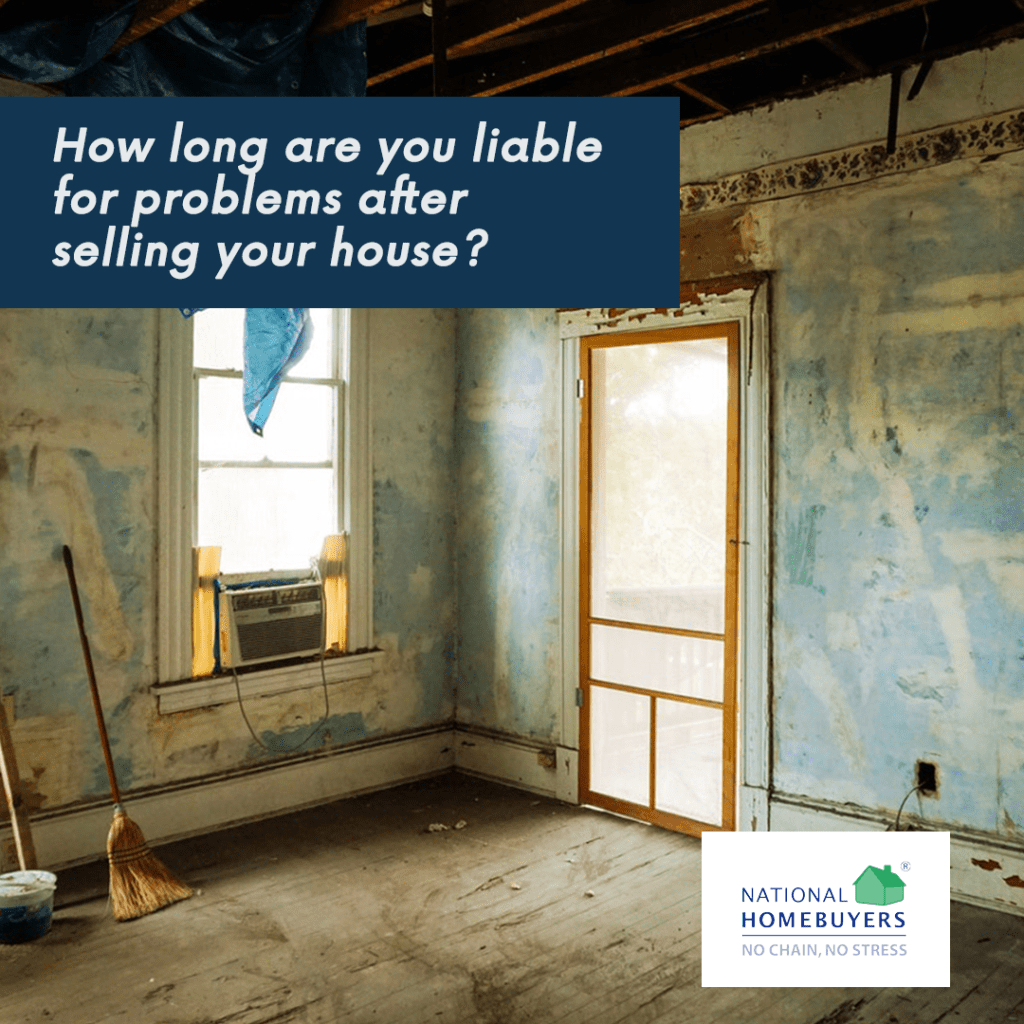Selling a house can be an exciting and nerve-wracking experience. But once the deal is done, and you’ve handed over the keys to the new owners, you may find yourself wondering how long your responsibilities and liabilities still extend. In the UK, the duration of your liability after selling a house varies depending on certain factors. From potential claims, to warranties and guarantees, this article explores the timeframe in which you may still be held liable, providing you with a clear understanding of your post-sale obligations.


1. Property Law in the UK
When it comes to property law in the UK, there are several legal obligations and responsibilities that sellers need to be aware of. Understanding these obligations is crucial in ensuring a smooth and legally compliant property transaction. This article will guide you through the various aspects of property law in the UK, including legal obligations, transfer of responsibilities, liabilities, dispute resolution, and the importance of proper disclosure.
1.1 Legal Obligations
Before selling a house in the UK, it is important to understand the legal obligations that come with it. Sellers have a responsibility to ensure that the property is compliant with all relevant laws and regulations. This includes obtaining necessary planning permissions, adhering to building regulations, and addressing any environmental issues. Failure to meet these legal obligations can result in severe consequences, including legal penalties and reputational damage.
1.2 Transfer of Legal and Financial Responsibilities
When selling a house, there is a transfer of legal and financial responsibilities from the seller to the buyer. It is essential to understand the implications of this transfer and ensure that all legal and financial aspects are properly addressed. This includes transferring ownership of the property, settling any outstanding debts and charges, and providing accurate information about the property’s condition to the buyer.
2. Responsibilities before Selling a House
Before selling a house in the UK, there are several responsibilities that sellers need to fulfill. These responsibilities not only ensure legal compliance but also help build a transparent and trustworthy transaction.
2.1 Ensuring Legal Compliance
One of the primary responsibilities of a seller is to ensure that the property is legally compliant. This includes obtaining all necessary permits and permissions, such as planning permissions and building regulations approval. Sellers should also address any potential legal issues, such as boundary disputes or violations of environmental regulations, before putting the property on the market.
2.2 Providing Accurate Information
Sellers have a legal obligation to provide accurate and truthful information about the property to potential buyers. This includes disclosing any known defects, ongoing disputes, or other issues that may affect the buyer’s decision. Failure to provide accurate information can lead to legal consequences, as buyers have the right to take legal action for misrepresentation.
2.3 Conducting Proper Property Surveys
Before selling a property, it is advisable for sellers to conduct proper property surveys. These surveys help identify any potential defects or issues that may not be immediately visible. By conducting a thorough survey, sellers can address any necessary repairs or maintenance before putting the property on the market, ensuring a smoother transaction and reducing the risk of future disputes.
2.4 Dealing with Existing Liabilities
Sellers also have a responsibility to address any existing liabilities associated with the property. This includes settling any outstanding debts, charges, or mortgages and ensuring that the property is free from any encumbrances or legal claims. By resolving these liabilities before selling, sellers can provide a clean and marketable property to potential buyers.


3. Legal Aspects and Timeframes of Liability
Understanding the legal aspects and timeframes of liability is crucial for both sellers and buyers. Different types of liabilities have varying timeframes within which legal action can be taken. This section explores some key aspects of liability in property transactions.
3.1 Statute of Limitations
The statute of limitations determines the timeframe within which legal action can be pursued. In the UK, the general rule is that legal action must be initiated within six years from the date of the breach. However, for certain types of claims, such as claims for negligence or breach of contract, the timeframe may be extended to 15 years. It is important for sellers to be aware of these timeframes and potential liabilities beyond the sale.
3.2 Liability for Misrepresentation
Sellers can be held liable for misrepresentation if they provide false or misleading information about the property. The timeframe for bringing a claim for misrepresentation is usually six years from the date of the misrepresentation. However, if the misrepresentation is discovered at a later date, the timeframe may be extended. Sellers should ensure that all information provided is accurate and disclose any relevant facts to avoid potential liability.
3.3 Liability for Defects
Sellers can be held liable for defects in the property if they fail to disclose them or if they actively conceal them. The timeframe for claiming for defects is usually six years from the date of the sale, although it can be extended if the defect becomes apparent at a later date. Sellers should conduct proper property surveys, address any defects, and provide accurate information to avoid potential liability for defects.
3.4 Liability for Non-Disclosed Issues
Sellers can also be held liable for non-disclosed issues that significantly affect the value or use of the property. If a seller fails to disclose a known issue, such as a major structural defect or an ongoing legal dispute, they may be held liable for the resulting damages. Buyers typically have six years from the date of discovery to bring a claim for non-disclosure.
4. Resolving Post-Sale Disputes
Despite taking necessary precautions, disputes may still arise after the sale of a property. In such cases, it is important to understand the available options for resolution and seek appropriate assistance.
4.1 Negotiation and Mediation
In many cases, disputes can be resolved through negotiation and mediation. This involves engaging in open communication with the other party and attempting to reach a mutually acceptable solution. Mediation can be particularly helpful in facilitating productive discussions and finding common ground. By opting for negotiation and mediation, parties can save time, costs, and maintain amicable relationships.
4.2 Legal Dispute Resolution
If negotiation and mediation do not lead to a satisfactory resolution, parties can resort to legal dispute resolution methods. This may involve taking the dispute to court or engaging in alternative dispute resolution processes, such as arbitration or adjudication. Legal dispute resolution provides a formal means of resolving conflicts and allows for a binding decision to be made by a neutral third party.
4.3 Professional Liability and Compensation
In some cases, sellers may be held liable for professional negligence if they have obtained professional advice that has resulted in a loss or damage for the buyer. Sellers should be aware of their obligations when seeking professional advice and ensure that they engage competent professionals to avoid potential liability for professional negligence. If a seller is found liable, they may be required to compensate the buyer for the resulting damages.


5. Specific Timeframes for Different Liabilities
Different types of liabilities in property transactions have specific timeframes within which legal action can be taken. Sellers should be aware of these timeframes to understand their potential liabilities and take appropriate action.
5.1 Liability for Structural Defects
Liability for structural defects usually follows the six-year timeframe from the date of sale. Sellers should ensure that any significant structural issues are either addressed or disclosed to potential buyers to avoid potential liability beyond this timeframe.
5.2 Liability for Unsafe Building Works
Sellers can be held liable for unsafe building works if they failed to obtain necessary permits or approvals or if the works were carried out negligently. This liability typically follows the six-year timeframe from the date of sale, although it can be extended if the defect becomes apparent at a later date.
5.3 Liability for Non-Compliance with Building Regulations
If a seller fails to comply with building regulations, they may be held liable for any resulting issues or damages. The timeframe for bringing a claim for non-compliance with building regulations is usually six years from the date of sale.
5.4 Liability for Environmental Issues
Sellers can be held liable for environmental issues if they fail to disclose known contamination or pollution on the property. The timeframe for bringing a claim for such issues is typically six years from the date of discovery.
5.5 Liability for Outstanding Debts and Charges
Sellers have a responsibility to settle any outstanding debts and charges associated with the property before selling. Failure to do so may result in potential liability for the buyer and can give rise to legal disputes. Sellers should ensure that all debts and charges are resolved before completing the sale.
6. Protection and Limitations for Sellers
To protect themselves from potential liabilities, sellers in the UK can take certain precautions and obtain professional advice.
6.1 Obtaining Professional Advice
Sellers should consider seeking professional advice from property solicitors or conveyancers to ensure compliance with all legal obligations and to understand the risks involved. Professional advice can help sellers navigate the complexities of property law and provide guidance on disclosure requirements and potential liabilities.
6.2 Taking out Indemnity Insurance
Indemnity insurance can provide an additional layer of protection for sellers by covering the costs of potential legal claims arising from undisclosed or unknown issues. Sellers should consider taking out indemnity insurance to mitigate risks and protect themselves from future liabilities.


7. Consequences of Breaching Liabilities
Breaching liabilities in property transactions can have significant consequences, both from a legal and financial perspective. Sellers should be aware of the potential penalties and implications that may arise from breaching their obligations.
7.1 Legal Penalties
Breaching legal obligations can result in various legal penalties, including fines, injunctions, and orders to carry out necessary repairs or remedial works. Sellers may also be required to pay damages to the buyer for any losses suffered due to the breach.
7.2 Financial and Reputation Implications
Breaching liabilities can have financial implications for sellers, as they may be required to compensate buyers for any resulting damages or losses. Additionally, breaches can harm a seller’s reputation in the market, leading to difficulties in future property transactions and potential legal disputes with other parties involved.
8. Importance of Proper Disclosure
Proper disclosure is essential in property transactions to ensure transparency and avoid potential legal disputes. Sellers should understand the importance of providing full and transparent information to potential buyers.
8.1 Providing Full and Transparent Information
Sellers have a duty to provide complete and accurate information about the property to potential buyers. This includes disclosing any known defects, ongoing disputes, or other relevant issues that may affect the buyer’s decision. By providing full and transparent information, sellers can foster trust and build a positive reputation in the market.
8.2 Impact on Seller’s Liability
Proper disclosure can have a significant impact on a seller’s liability. By disclosing all known issues, sellers may reduce the risk of legal claims in the future. Buyers have the right to rely on the information provided by sellers, and failure to disclose important facts can lead to potential liability and legal disputes.


9. Changes in Liability with Time
Liabilities in property transactions can evolve over time due to changes in property law and regulations. Sellers should be aware of these changes and take necessary steps to preserve records and documentation.
9.1 Evolution of Property Law
Property laws and regulations can change over time, potentially affecting the liabilities of sellers. It is important for sellers to stay updated with any new legislation or changes in case law that may impact their obligations and potential liabilities.
9.2 Preserving Records and Documentation
Sellers should maintain accurate records and documentation related to the property, including permits, approvals, surveys, and any correspondence with professionals involved in the transaction. These records can be invaluable in case of future disputes or questions regarding liability. By preserving records and documentation, sellers can demonstrate their compliance with legal obligations and provide evidence to support their position.
10. Seeking Legal Advice
Given the complexities of property law and the potential liabilities involved, sellers should consider seeking legal advice from property solicitors or experts in the field.
10.1 Consulting with Property Solicitors
Property solicitors can provide specialized advice and guidance on property transactions, legal obligations, and potential liabilities. They can help sellers navigate the complexities of property law, conduct due diligence, and ensure compliance with all legal requirements.
10.2 Engaging Expert Witnesses
In cases where disputes arise, engaging expert witnesses can provide valuable insights and evidence. Expert witnesses can provide professional opinions on issues such as structural defects, building regulations compliance, or environmental concerns. Their expertise can be instrumental in resolving disputes and determining liability.
In conclusion, understanding property law and the associated obligations and liabilities is crucial for sellers in the UK. By fulfilling their responsibilities, providing accurate information, conducting necessary surveys, and addressing existing liabilities, sellers can ensure a smooth property transaction while minimizing potential legal disputes. Seeking legal advice and taking necessary precautions, such as obtaining indemnity insurance, can further protect sellers and mitigate risks. Proper disclosure and transparency play a vital role in providing a trustworthy transaction and avoiding potential liabilities. By staying informed about changes in property law and preserving records, sellers can adapt to evolving obligations and effectively manage their liabilities.







